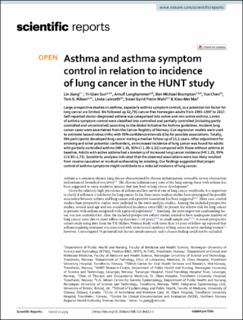Asthma and asthma symptom control in relation to incidence of lung cancer in the HUNT study
Jiang, Lin; Sun, Yi-Qian; Langhammer, Arnulf; Brumpton, Ben Michael; Chen, Yu; Nilsen, Tom Ivar Lund; Leivseth, Linda; Wahl, Sissel Gyrid Freim; Mai, Xiao-Mei
Peer reviewed, Journal article
Published version

Åpne
Permanent lenke
https://hdl.handle.net/11250/2736790Utgivelsesdato
2021Metadata
Vis full innførselSamlinger
Sammendrag
Large prospective studies on asthma, especially asthma symptom control, as a potential risk factor for lung cancer are limited. We followed up 62,791 cancer-free Norwegian adults from 1995–1997 to 2017. Self-reported doctor-diagnosed asthma was categorized into active and non-active asthma. Levels of asthma symptom control were classified into controlled and partially controlled (including partly controlled and uncontrolled) according to the Global Initiative for Asthma guidelines. Incident lung cancer cases were ascertained from the Cancer Registry of Norway. Cox regression models were used to estimate hazard ratios (HRs) with 95% confidence intervals (CIs) for possible associations. Totally, 984 participants developed lung cancer during a median follow-up of 21.1 years. After adjustment for smoking and other potential confounders, an increased incidence of lung cancer was found for adults with partially controlled asthma (HR 1.39, 95% CI 1.00–1.92) compared with those without asthma at baseline. Adults with active asthma had a tendency of increased lung cancer incidence (HR 1.29, 95% CI 0.95–1.75). Sensitivity analyses indicated that the observed associations were less likely resulted from reverse causation or residual confounding by smoking. Our findings suggested that proper control of asthma symptoms might contribute to a reduced incidence of lung cancer.
